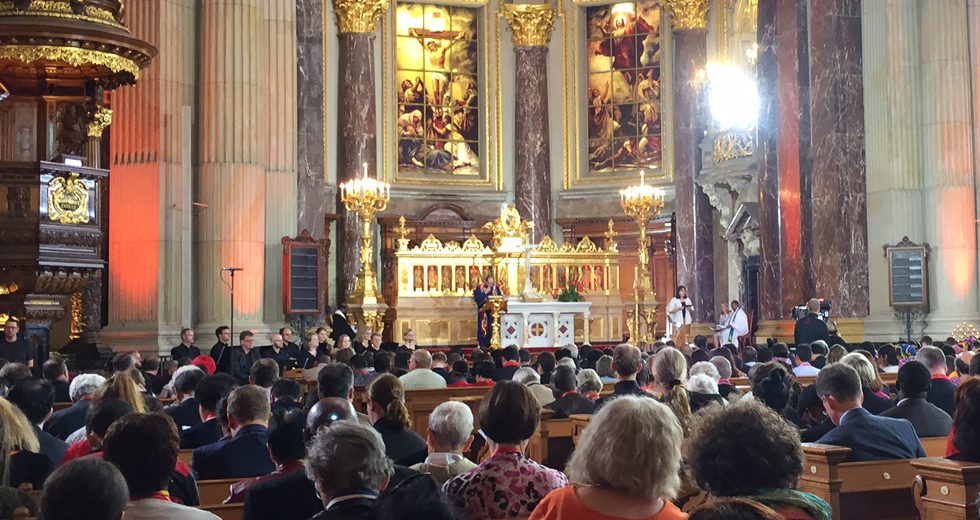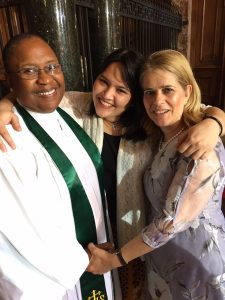WCRC witnesses to the world in Berlin
Posted on July 2, 2017 by Aiko Sumichan

by Stephen Brown
Christians have to stand against all forms of injustice in the economy and the environment, Chris Ferguson, general secretary of the World Communion of Reformed Churches (WCRC), said in a sermon at a service in Berlin’s Protestant cathedral.
The world is “dominated by war, violence, massive forced migration, gender-based violence, with economic and ecological injustices destroying people and planet,” Ferguson said at the 2 July service held as part of the WCRC’s General Council.
WCRC President Jerry Pillay began worship by referring to the many unsolved conflicts worldwide and the many victims of unjust economic and political systems. “What is needed is that people can live together in respect, in dignity and in good neighbourhood,” he said.
The 1000 or so participants attending the General Council being held in the eastern German city of Leipzig from 29 June to 7 July travelled to Berlin for the service, broadcast live on German television and live-streamed around the world.
“We believe that God is, in a special sense, the God of the suffering, the poor and the downtrodden,” Bishop Petra Bosse-Huber, responsible for ecumenical relations for the Evangelical Church in Germany (EKD), said in an opening prayer.

Yvette Noble-Bloomfield, Aiko Sumichan and Alexandra Nikolara before the worship
Gathered under the cathedral’s massive dome, worshippers heard WCRC representatives speaking of the challenges facing Christians in their regions.
In the Caribbean, said Yvette Noble-Bloomfield from Jamaica, poverty and wealth coexist, and the effects of poverty particularly affect woman and children. “Poverty’s realities are stark and leave those touched by it vulnerable, naked, homeless, depressed and distressed,” she said.
Aiko Sumichan from Indonesia told of living as a religious minority in her country, warning that mistrust and fear between followers of different religions can destroy confidence, and turn neighbours into enemies. “We pray that people can practice their faith peacefully among others,” she said.
Greek participant Alexandra Nikolara recounted how she is working to support refugees arriving in the country. “We witness how people are losing their loved ones, their homes, their story, their life, when war and misery forces them to leave all behind,” she said.
With readings, prayers and testimonies in English, German and Greek, the service was accompanied by a Gospel choir, the brass ensemble of the Evangelical-Reformed Church in Germany and organist Andreas Sieling.
Opened in 1905 and built in a baroque style, the cathedral features statues of Martin Luther, John Calvin, Ulrich Zwingli and Philipp Melanchthon, symbolizing the union of the Lutheran and Reformed traditions of Protestantism, said church president Volker Jung, vice-chair of the Union of Evangelical Churches (UEK) in a greeting to participants.
The cathedral is less than one mile (1.6 kilometres) from the Brandenburg Gate, which stands at where the eastern and western parts of the city were divided by the Berlin Wall from 1961 to 1989.
“Barbed wire and the death strip, watchdogs, border guards shooting refugees – all this is still present in the memory of the city,” said Berlin’s Protestant bishop, Markus Dröge, welcoming WCRC participants to his city.
Now the Brandenburg Gate is a symbol of freedom, said Dröge, that needs “to be preserved, cared for and defended.”
Following the service, General Council members attended a reception at the nearby foreign ministry hosted by the State Secretary at the German Foreign Office, Walter Lindner, and the German Minister of the Environment, Barbara Hendricks.
Welcoming WCRC delegates, Lindner highlighted the contribution of religions to world peace, environmental protection, human rights, support for refugees, and working to reduce the gap between rich and poor.
Hendricks spoke of the close links between social environmental policies and paid tribute to Christian organizations working “for a fairer world and environmental protection.”
After the reception, participants took part in solidarity visits to diaconal projects around Berlin.
 World Communion of Reformed Churches
World Communion of Reformed Churches